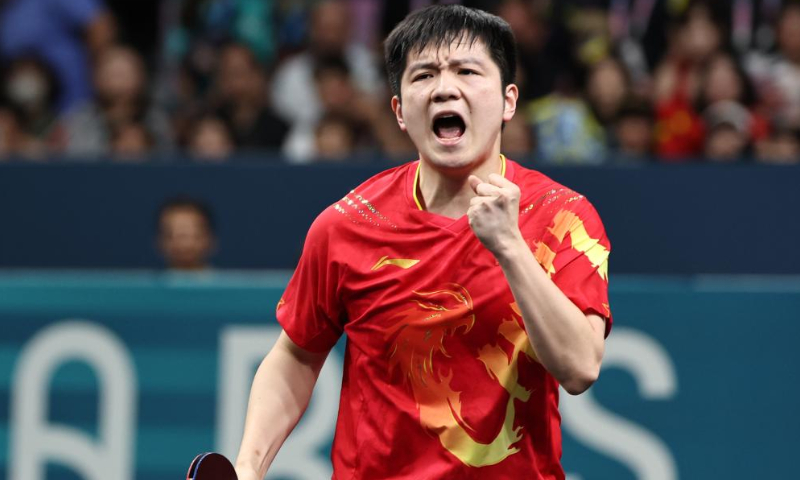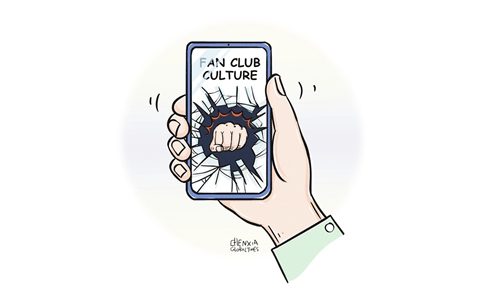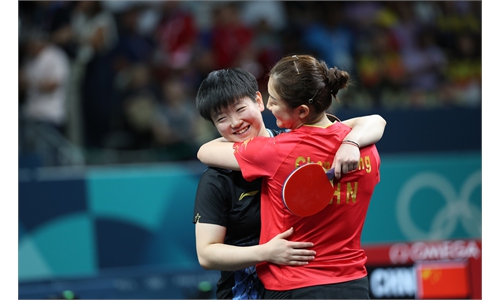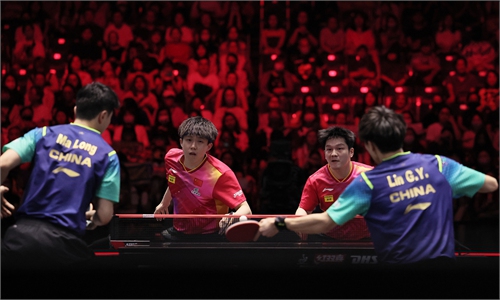ARTS / CULTURE & LEISURE
China’s General Administration of Sport targets toxic fandom culture

Fan Zhendong of China reacts during the men's singles gold medal match of table tennis between Truls Moregard of Sweden and Fan Zhendong of China at the Paris 2024 Olympic Games in Paris, France, on August 4, 2024. Photo: Xinhua/Wang Dongzhen
Director of the administration Gao Zhidan stressed that the crackdown on toxic fandom should be integrated into the broader ideological work of the sports system. He called for a strong stance against the escalating "fan circle" behaviors and urged the removal of the conditions that allow such a culture to thrive in the sports domain.
Gao said the increasing influence of fandom culture has disrupted the sports sector and posed significant risks to its healthy development. He also urged to be highly vigilant against the tendency toward the excessive commercialization of sports.
The meeting follows recent statements from the Chinese Table Tennis Association and the Chinese Gymnastics Association on August 17, both of which expressed support for law enforcement actions against illegal activities related to toxic fandom.
On August 15, the Ministry of Public Security disclosed details about four cases in sports.
Olympic women's 3m springboard champion Chen Yiwen revealed on Instagram on Wednesday that she had been the target of malicious rumors spread by two sports journalists. According to the chat screenshots she released, the other party even threatened to add stimulants to Chen's food to get her banned for life.
During an interview aired on August 18, table tennis star Fan Zhendong expressed concerns about the pressure caused by fandom culture, saying it has negatively impacted both his performance and the team's unity.
Pan Zhanle, a 20-year-old swimming prodigy who broke a world record at the Paris Olympics, disbanded his fan group. Pan previously mentioned in a CCTV interview that some fans waited for autographs outside his hotel and he said he just "hoped to be low-key and quiet."
During the women's singles final at the Paris Olympics on August 3, which featured Chinese players Sun Yingsha and Chen Meng, some fans displayed favoritism toward Sun while booing Chen when Chen defeated Sun to become the women's singles champion.
During an interview on August 7, Chen urged fans to appreciate the athletes' determination and approach competition outcomes with a balanced perspective, rather than focusing solely on the results.
"Most of these so-called fans do not understand or appreciate the professional skills or talents of famous athletes. Instead, they tend to focus solely on the athlete's image and appearance," Wang Dazhao, a Beijing based sports commentator, told the Global Times. "To support their idols, fans in this toxic culture see no teammates, only enemies and anyone who hinders their idol's pursuit of victory becomes a target for attack."
"Those who invade others' privacy should be punished, while those who do not violate the Criminal Law should be educated and warned," Wang said.
Last month, several social media platforms, including Sina Weibo and Douyin, announced measures to combat toxic fandom, such as removing harmful content and suspending or banning related accounts.



